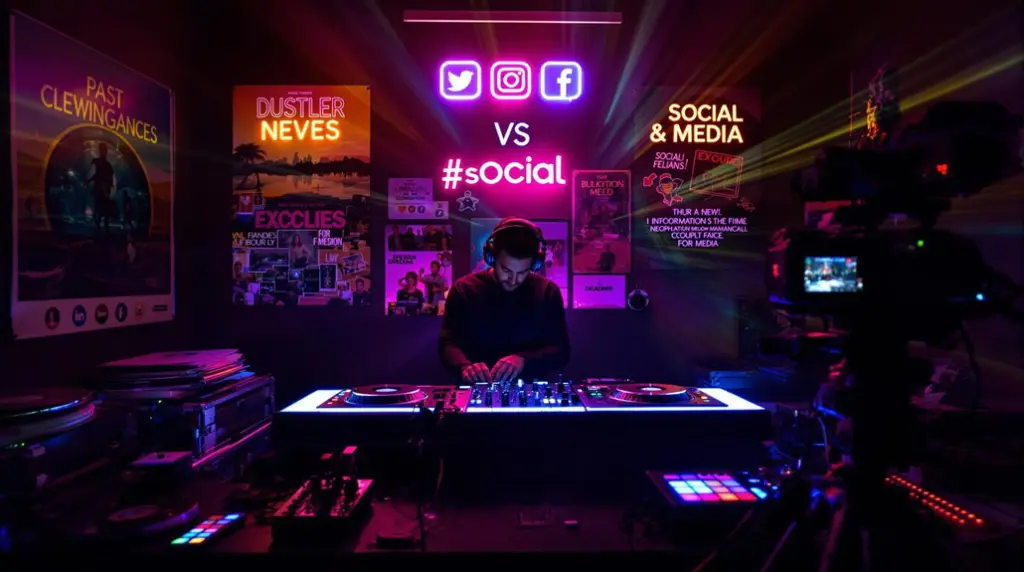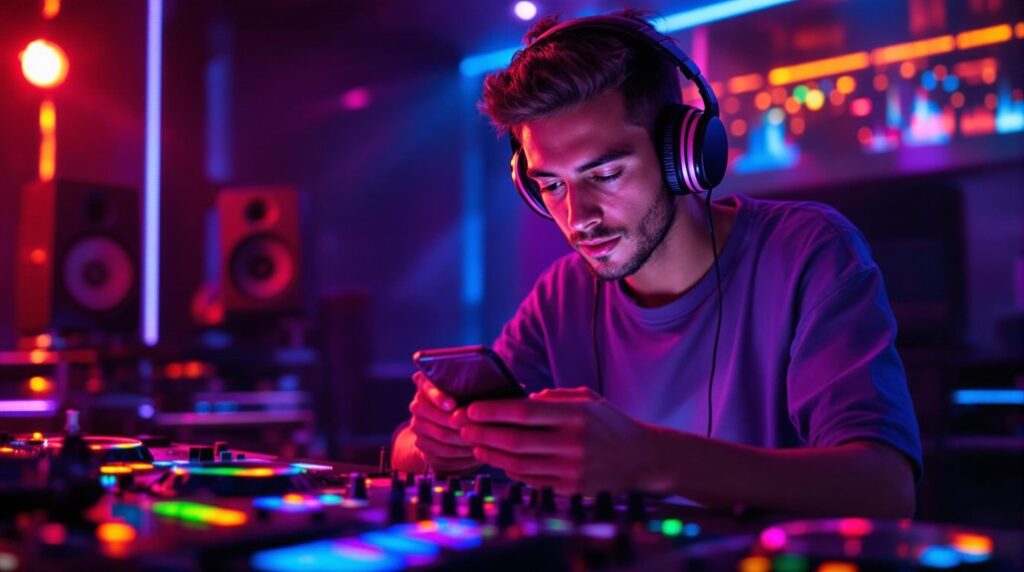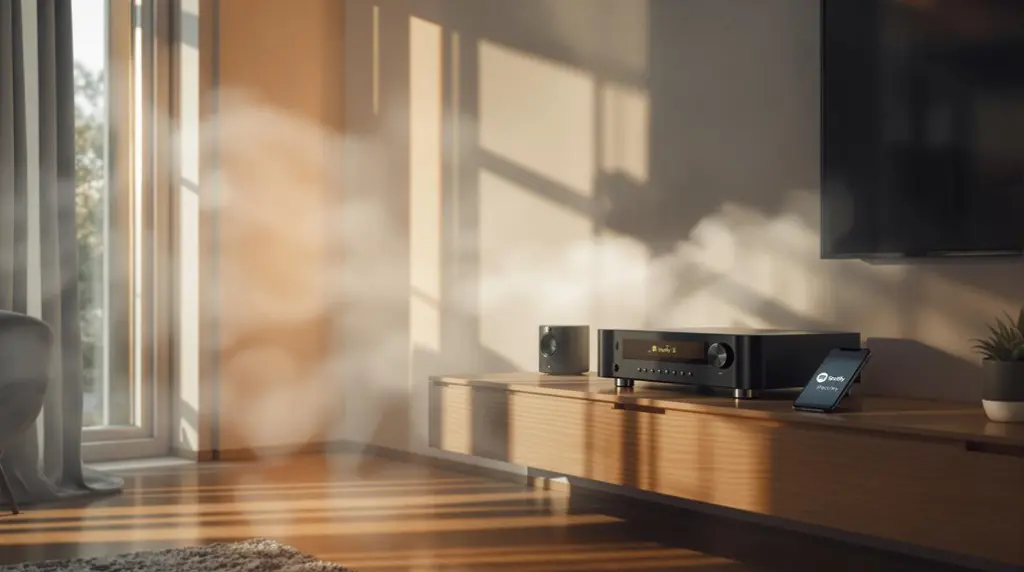To DJ legally with unlicensed music, you’ll first want to explore using public domain tracks. These are completely free from copyright and safe to use without restrictions. Alternatively, you can secure direct artist agreements. By directly negotiating with artists, you can obtain explicit permission to use their tracks, ensuring compliance while supporting the creators. For broader options, consider subscribing to a royalty-free music service. These platforms offer a vast selection of tracks for a monthly fee, giving you legal access without the complications of individual track licensing. More strategies are available, offering deeper insights into legally sound DJing practices.
Key Takeaways
- Utilize music from the public domain, as it’s free for anyone to use legally.
- Negotiate direct artist agreements to secure explicit permission for track use.
- Incorporate royalty-free music to avoid licensing fees and simplify music sourcing.
- Ensure compliance by documenting all permissions and agreements with artists or rights holders.
- Avoid playing any copyrighted music without appropriate licenses or explicit permission.
Understanding Copyright Laws
To legally DJ with unlicensed music, you must first grasp the essentials of copyright laws that protect musicians’ exclusive rights to their creations. These laws are designed to guarantee that artists receive recognition and financial benefit from their work, and they play a critical role in your ability to use music in your sets without facing legal repercussions.
Understanding these laws, you’ll find two key concepts particularly relevant: important exceptions and public domain music. Important exceptions allow limited use of copyrighted material without permission under specific circumstances, such as for educational purposes or in a parody. However, it’s vital to note that playing music as a DJ doesn’t typically qualify for these exceptions due to the commercial nature of DJ performances.
On the other hand, public domain music refers to works that aren’t protected by copyright and are free for anyone to use. Music typically enters the public domain because copyright has expired, or the creator has forfeited their rights. You’re free to use these tracks in your performances without any legal constraints, offering a safe harbor when looking to enrich your DJ sets without the burden of licensing fees.
Acquiring Public Performance Licenses
After understanding the basics of copyright laws and public domain music, you’ll need to secure public performance licenses to legally play copyrighted music in public venues. Organizations like ASCAP, BMI, and SESAC are key players in this arena, offering the necessary licenses for DJs to make sure that artists receive their due royalties.
The license application process is straightforward but essential. First, you’ll identify the appropriate licensing organization based on the music you intend to play. Each has a unique catalog, so your choice may depend on your musical selections. Once chosen, you can apply directly on their websites, where you’ll provide details about your events and venues.
Obtaining these licenses isn’t just a legal formality; it offers significant benefits. With a public performance license, you’re free to play a vast array of music without individual track permissions, which is ideal for a DJ who needs flexibility and variety in their playlists. Additionally, these licensing agreements support the music industry by ensuring that creators and rights holders are compensated, fostering a sustainable environment for artists to continue producing the music you love to play.
Direct Artist Agreements
Direct artist agreements offer you, the DJ, a legal pathway to use specific tracks without needing traditional licenses. By negotiating directly with artists, you can secure permission to include their music in your live sets, ensuring you stay on the right side of the law. These agreements are vital as they not only prevent potential legal issues but also establish a clear, documented right for you to play the music.
When entering into these agreements, effective negotiation tactics are essential. Start by clearly understanding and respecting the artist’s work and rights. Approach them with a well-prepared proposal that outlines how their music will be used, the scope of your performance, and any potential benefits for them. Remember, building strong artist relationships is key—artists are more likely to grant permissions if they trust you and feel valued.
Ensure all agreements are put in writing. This formal documentation should specify the terms agreed upon, including the duration of permission and any particular conditions set by the artist. Having everything in writing not only protects both parties but also gives you peace of mind as you perform, knowing you’re fully compliant with the law.
Utilizing Royalty-Free Music
You can significantly reduce costs and simplify your music sourcing by utilizing royalty-free music in your DJ sets. This approach allows you to bypass the need for a PRS PPL license, cutting down on hefty licensing fees. Additionally, opting for royalty-free tracks means you’re not subject to the complexities of traditional music royalties, simplifying your operational framework.
Integrating royalty-free music into your DJing techniques can enhance your music selection without compromising the quality of your performances. The flexibility of monthly payment options for these music services also makes it a viable option for maintaining a fresh and diverse playlist, important for keeping your sets dynamic and engaging.
Furthermore, leveraging royalty-free music can be a cornerstone in your marketing strategies. By promoting your use of legal, cost-effective music solutions, you can boost your brand’s image. Effective social media engagement involves sharing insights into your ethical practices, which resonates well with a copyright-conscious audience. Highlighting your commitment to legal music sourcing on platforms like Instagram or Twitter not only builds trust but also sets you apart in a competitive market, where authenticity and transparency are highly valued.
Legal Risks of Unlicensed DJing
While utilizing royalty-free music helps to mitigate many legal risks, it’s vital to acknowledge that playing unlicensed tracks exposes you to severe legal consequences. If you choose to spin these tracks, you’re risking not just financial penalties but also potential lawsuits for copyright infringement. This isn’t just about a slap on the wrist; you could face significant damages that might cripple your financial stability.
Furthermore, disregarding the legalities of DJing can seriously harm your professional reputation. Once you’re labeled as a DJ who plays unlicensed music, venue owners and event organizers might think twice before booking you. They typically prefer to avoid the legal risks associated with unlicensed performances. Remember, in this industry, your reputation can be as important as your skills at the decks.
To safeguard yourself, it’s vital to make sure all the music you play is covered by the appropriate licenses. This compliance isn’t just a legal formality—it’s an integral aspect of maintaining your professionalism and standing within the music community. By adhering to copyright laws, you protect yourself from legal action and uphold the respect you’ve worked hard to earn in the DJing scene.
Frequently Asked Questions
How Do DJS Use Music Without Copyright?
You can use music without copyright by leveraging tracks under Creative Commons licenses or applying Fair Use principles, ensuring you’re legally covered when performing or distributing these works in your sets.
Do You Need a Music License to Dj?
Yes, you need a music license to DJ. Securing performance rights through venue agreements or directly from PROs guarantees you’re legally covered and that artists are compensated for their work.
Can I Be a DJ Without Knowing Music?
Yes, you can DJ without knowing music by focusing on skill development and mastering equipment basics. Utilize tools like auto-sync to help, but consider learning music theory to enhance your performances.
Can You Use Unlicensed Music?
You can’t use unlicensed music without potential legal issues. Instead, explore Creative Commons or adhere to fair use principles to guarantee your DJ sets remain compliant and free from copyright infringement.
Conclusion
You’ve grasped the essentials of DJing within legal boundaries. Remember, respecting copyright laws keeps you clear of legal issues. Secure public performance licenses or direct agreements with artists to make certain all music is legitimately used.
Consider royalty-free tracks as a hassle-free alternative. Ignoring these steps exposes you to significant legal risks, potentially derailing your DJ career.
Stay informed, stay legal, and keep the music playing without any setbacks.




